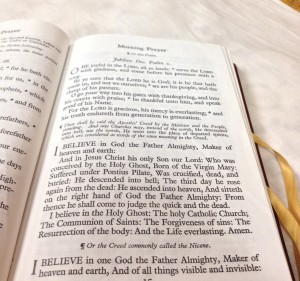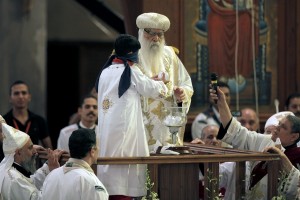From the Psalter:
“Greatly have they oppressed me since my youth,”
let Israel now say;
“Greatly have they oppressed me since my youth,
but they have not prevailed against me.”
The plowmen plowed upon my back
and made their furrows long.
(From the Daily Office Lectionary – Psalm 129:1-3 (BCP Version) – August 20, 2014)
 Truth, United States Senator Hiram Johnson observed in 1917, is the first casualty of war. When war becomes nearly universal is truth in danger of being fully obliterated? I don’t think so; I think truth will ultimately survive and prevail. My faith is that the Truth will no doubt prevail, but for the moment, I am speaking neither of grand philosophical concepts nor of the One who made the audacious claim, “I am the Truth.” (Jn 14:6) Rather, I speak simply of factual accuracy and of the intellectual integrity of those who communicate; that truth is suffering some mighty hurtful body blows at present.
Truth, United States Senator Hiram Johnson observed in 1917, is the first casualty of war. When war becomes nearly universal is truth in danger of being fully obliterated? I don’t think so; I think truth will ultimately survive and prevail. My faith is that the Truth will no doubt prevail, but for the moment, I am speaking neither of grand philosophical concepts nor of the One who made the audacious claim, “I am the Truth.” (Jn 14:6) Rather, I speak simply of factual accuracy and of the intellectual integrity of those who communicate; that truth is suffering some mighty hurtful body blows at present.
Following up on Senator Johnson’s observation several decades later, linguist William Lutz (best known as the editor of the Quarterly Review of Doublespeak) suggested language as an alternative “first casualty of war” because, he said, “with language goes the truth.” In a 1992 essay in English Today, Lutz argued that in times of war and conflict language becomes corrupted and turned into “an instrument for concealing and preventing thought, not for expressing or extending thought.” (The First Casualty)
I was reminded of Johnson and Lutz this week when Missouri’s Republican lieutenant governor, in response to the civil unrest in Ferguson following the killing of Michael Brown, an 18-year-old black man, by a white police officer, suggested that those with grievances (and they and their complaints are many and legitimate) should turn not to the streets but to the “Anglo-American jurisprudence tradition.” Almost immediately a fire-storm erupted on social media and in the left-leaning press accusing the man of being a “white supremacist” because of his use of the term “Anglo-American.”
I was particularly astounded to see religious journalists, pastors, preachers, and essayists, friends and colleagues whom I respect, jumping on this bandwagon. I suggested in a couple of Facebook discussions that “Anglo-American” is not a white racist buzzword, that it is a term of art to those who study or have studied (as the Missouri politician and I both have) the law and the history of the American judicial system. It refers to the historical reality that our system and our preconceptions of fairness, equity, and justice stem from origins in the laws and processes of England and English jurisprudence (the “Anglo” part) imported to and further developed in this country (the “American” part). I have no doubt that our judicial system (and our entire society) embody a systemic racism that must be addressed, but vehement criticism of the Missouri lieutenant governor for use of a longstanding and venerable term of art is not the way to do it. As I pointed out, I have used the term “Anglo-American” myself on many occasions in briefs, oral arguments, and lectures, and I have never used it to mean “white supremacy,” so I give the Missouri politician the benefit of the doubt.
As I thought more about it, it took me back to my college days in the late 1960s and early 1970s in Southern California. Those were the heydays of La Raza Unida, LULAC, the United Farm Workers, and other Chicano labor and political organizations. (Does anyone even use the terms “Chicano” or “Chicana” any longer?) In the rhetoric of the day, any non-hispanic caucasian was an “Anglo.” It didn’t matter where in northern Europe one’s ancestors may actually have come from — Ireland, France, and Germany (my own heritage), Poland and Ukraine (my then-girlfriend’s background), or Scandinavia (my roommate’s family), we were all “Anglos.” What had previously been a prefix referring specifically to the English became an all-inclusive term for white people in general. The racial and ethnic conflict of the day corrupted the language; truth suffered. Apparently, the corruption still taints almost a half-century later.
Then this evening’s psalm — “let Israel now say” — and I am confronted with my own failure to embrace multiple word meanings, my own tendency to corrupt language and to distort truth! I hear the words of the psalm, “Greatly have they oppressed me since my youth,” and I hear them as untrue in today’s world. Israel (the modern nation state) is not oppressed; it is the oppressor! I hear Israel’s metaphoric claim that “plowmen [have] plowed upon my back,” and it rankles me! It is Israel with her air force and her bombs who is “plowing upon the backs” of others! I must divorce myself from my modern irritation for it is not the psalm but my reaction to it which is untrue. The word Israel is a word of many meanings, for some of which the psalm is true; for others, not.
Who is this “Israel”? What does the name mean?
Israel could mean
- Jacob, son of Isaac, who spent a night wrestling with God and was given this new name
- His genetic descendants
- Those who adhere to the religion of Judaism as it has evolved from its earliest beginnings
- Those like myself who adhere to the Christian faith, the “New Israel” grafted to the old (Romans 11)
- The ancient ethnic “nation” of diverse tribes (twelve?) who inhabited the eastern Mediterranean, through its various permutations of governance
- The original singular kingdom which was one of the iterations of that “nation”
- The subsequent northern kingdom which rebelled against the central imperial government and established itself as a separate entity
- The modern nation state established by United Nations Resolution 181 in 1947
- The land on which that nation state sits
- The additional land of “Greater Israel” claimed by ultra-Orthodox Zionists
- And a host of additional meanings others may list
How I hear, interpret, pray, accept, reject, or otherwise respond to this evening’s (and any other) psalm naming “Israel” depends on which of these meanings I choose to accept at the moment, and in that choice lies either truth or falsehood. If I choose to accept only one of those meanings to the exclusion of all others, I corrupt language, I betray truth.
The internet discussion of “Anglo” focused (I think) on a single, limited understanding of the term and, in doing so, distorted it and betrayed the truth. There may have been truth — the truth of white privilege, the truth of non-uniform application of laws, the truth of a sometimes failing judicial system — but there was also falsehood and distortion — the condemnation of the Missouri lieutenant govern as a racist (he may be, I don’t know, but the use of the word is hardly sufficient evidence by itself), the dismissal of the historical term is nothing more than a “white supremacist buzzword,” the rejection of the notion of “Anglo-American civilization” as an oxymoron.
Back in college, I often protested, “I am not an Anglo!” My Irish and French ethnic heritage bristles at the very suggestion. And, yet, as an Anglican Episcopalian, as an American lawyer, as a speaker of the English language (corrupted though my American version may be), and in may other ways, I am very much an Anglo. As a student and practitioner of Anglo-American jurisprudence (I am still licensed and admitted to practice in two states and before the Federal judiciary), I am an Anglo. As a user of the term “Anglo-American,” however, I am not a white supremacist but, as a white person in the “Anglo-American civilization” which the Missouri politician lauded, I am a person who possesses (and must be conscious of) white privilege. Youthful protest notwithstanding, I must accept and admit that I am an Anglo.
My negative reaction to the psalm is the same. To be certain, in one sense, the modern state of Israel is not oppressed, nor is its back being plowed, but perhaps in another sense there is truth about the modern nation in the ancient psalm. If I am to hear that truth, I must not distort the language by closing off alternative understandings.
Who are these “Anglos”? Who is this “Israel”? There is more than a single answer to each question and the answers are many and varied, and in all of the several answers there is truth.
“What is truth?” Pilate famously asked. (Jn 18:38) Jesus did not answer him, but had elsewhere asserted, “You will know the truth, and the truth will make you free.” (Jn 8:32) It will only do so if we open ourselves to it. Truth is multi-vocal, and even though we may not want wish to hear all of the voices of truth, but we need to do so. To the extent that we limit, distort, or corrupt the language of our conversations, religious or political, we will be unable to hear its many voices. We must be open to truth’s multi-vocality; only then will the truth set us free.
====================
A request to my readers: I’m trying to build the readership of this blog and I’d very much appreciate your help in doing so. If you find something here that is of value, please share it with others. If you are on Facebook, “like” the posts on your page so others can see them. If you are following me on Twitter, please “retweet” the notices of these meditations. If you have a blog of your own, please include mine in your links (a favor I will gladly reciprocate). Many thanks!
====================
Father Funston is the rector of St. Paul’s Episcopal Church, Medina, Ohio.
 I love Psalm 121 for a variety of reasons. It is the psalm which the sanctoral lectionary provides for the feast of St. Francis of Assisi (October 4), always a favorite saint. It is the psalm my late mother chose to be read at her funeral. It is one of the psalms of ascent which pilgrims to the Temple are believed to have sung as they made their way to Jerusalem for the major festivals of ancient Judaism; on pilgrimage in Israel and Palestine, my wife and I recalled it as we rode in a travel coach from Ben Gurion Airport in Tel Aviv to ancient city. There many good memories, some joyful, some sad, all meaningful, associated with it.
I love Psalm 121 for a variety of reasons. It is the psalm which the sanctoral lectionary provides for the feast of St. Francis of Assisi (October 4), always a favorite saint. It is the psalm my late mother chose to be read at her funeral. It is one of the psalms of ascent which pilgrims to the Temple are believed to have sung as they made their way to Jerusalem for the major festivals of ancient Judaism; on pilgrimage in Israel and Palestine, my wife and I recalled it as we rode in a travel coach from Ben Gurion Airport in Tel Aviv to ancient city. There many good memories, some joyful, some sad, all meaningful, associated with it. Did Jesus actually say these things? Most contemporary bible scholars would probably answer “No.” The author of John’s Gospel has made Jesus say the things a largely Jewish community of the church in the late 1st Century, a church struggling to cope with its separation from traditional Judaism, believed about Jesus; Jesus is thus both the subject and the interpreter of the message of John’s Gospel. In the 21st Century, we might have preferred the author to have included the interpretation of Jesus in the narrative, not in the words spoken by the character of Jesus portrayed here, but that’s not what we’ve got. What we’ve got is the Jesus remembered by a community with a highly developed Christology telling that community, and us, who Jesus was then and now.
Did Jesus actually say these things? Most contemporary bible scholars would probably answer “No.” The author of John’s Gospel has made Jesus say the things a largely Jewish community of the church in the late 1st Century, a church struggling to cope with its separation from traditional Judaism, believed about Jesus; Jesus is thus both the subject and the interpreter of the message of John’s Gospel. In the 21st Century, we might have preferred the author to have included the interpretation of Jesus in the narrative, not in the words spoken by the character of Jesus portrayed here, but that’s not what we’ve got. What we’ve got is the Jesus remembered by a community with a highly developed Christology telling that community, and us, who Jesus was then and now. John uses the word “believe” three times in this short passage: once quoting Jesus about witnesses to his acts of power and twice regarding the royal official’s state of mind. What, precisely, does John mean by doing so? That is one of the ponderable but unanswerable questions about scripture, the precise meaning of a biblical author.
John uses the word “believe” three times in this short passage: once quoting Jesus about witnesses to his acts of power and twice regarding the royal official’s state of mind. What, precisely, does John mean by doing so? That is one of the ponderable but unanswerable questions about scripture, the precise meaning of a biblical author.  Shechem was known as Sychar in Jesus’ time. Near that land that Abraham had bought for use as a tomb, just a short walk south from the traditional location of Joseph’s tomb, is a well that belonged to Jacob. At that well, Jesus stopped to ask a Samaritan woman for a drink; part of the story of that meeting and Jesus’ conversation with the woman (the longest of all the conversations recorded in the Gospels) is today’s Gospel text (John 4:27-42).
Shechem was known as Sychar in Jesus’ time. Near that land that Abraham had bought for use as a tomb, just a short walk south from the traditional location of Joseph’s tomb, is a well that belonged to Jacob. At that well, Jesus stopped to ask a Samaritan woman for a drink; part of the story of that meeting and Jesus’ conversation with the woman (the longest of all the conversations recorded in the Gospels) is today’s Gospel text (John 4:27-42).  The second tomb is that of Fr. Justinus, the priest who took over the church from St. Philoumenos and continued his work of restoration. An accomplished artist, Fr. Justinus wrote all of the icons which now decorate the nave, sanctuary, and crypt, including an icon of the martyrdom of St. Philoumenos. Fr. Justinus’s tomb is empty because he is still alive. He built his tomb himself and it is placed just outside the front door of the church; he walks past it everyday coming from his residence in the neighboring monastery to the church. It is a daily reminder of his (and our) mortality and of the dangers he (and many) face in the on-going violence or threat of violence that characterizes the Holy Land today.
The second tomb is that of Fr. Justinus, the priest who took over the church from St. Philoumenos and continued his work of restoration. An accomplished artist, Fr. Justinus wrote all of the icons which now decorate the nave, sanctuary, and crypt, including an icon of the martyrdom of St. Philoumenos. Fr. Justinus’s tomb is empty because he is still alive. He built his tomb himself and it is placed just outside the front door of the church; he walks past it everyday coming from his residence in the neighboring monastery to the church. It is a daily reminder of his (and our) mortality and of the dangers he (and many) face in the on-going violence or threat of violence that characterizes the Holy Land today.

 I wasn’t going to mention this, really, but the mind makes strange associations and when I read the Gospel lesson this morning, particularly this line about the wind blowing where it will and us being unable to tell its origin or its destination, the image that came immediately to mind is an automobile turn signal.
I wasn’t going to mention this, really, but the mind makes strange associations and when I read the Gospel lesson this morning, particularly this line about the wind blowing where it will and us being unable to tell its origin or its destination, the image that came immediately to mind is an automobile turn signal. “In the tragedies in Iraq, Western Africa and Gaza, the waters of chaos are overwhelming us. My personal response right now is to keep my eyes on our Lord. My prayers ascend for all. Save us Lord.”
“In the tragedies in Iraq, Western Africa and Gaza, the waters of chaos are overwhelming us. My personal response right now is to keep my eyes on our Lord. My prayers ascend for all. Save us Lord.”

